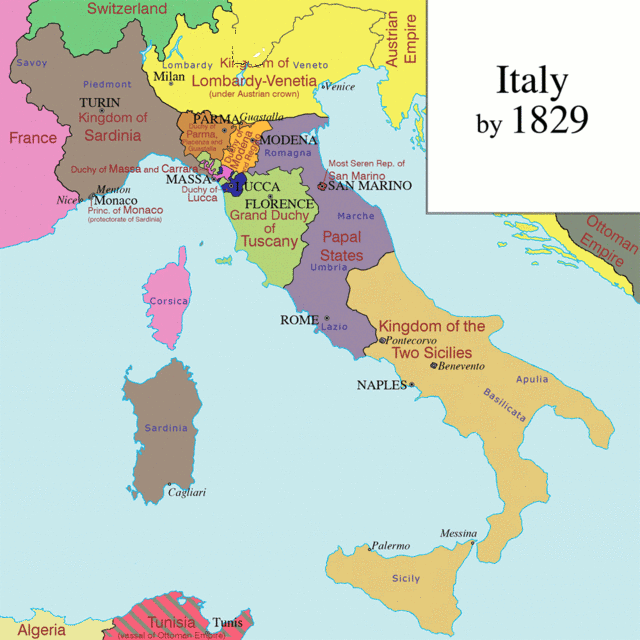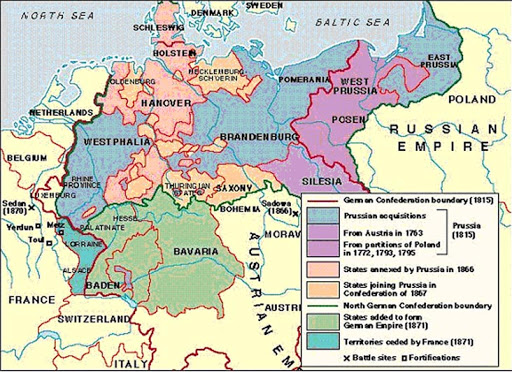7.3 National Unification and Diplomatic Tensions
4 min read•june 18, 2024
Jillian Holbrook
AP European History 🇪🇺
335 resourcesSee Units
The Crimean War demonstrated the weakness of the Ottoman Empire and contributed to the breakdown of the Concert of Europe, thereby creating the conditions in which Italy and Germany could be unified after centuries of fragmentation. Ultimately, the Concert of Europe failed to address growing nationalism in Italy and Germany, an issue that led to the Italian War of 1859 and the Franco-Prussian War of 1870, which resulted in the unification of Italy and Germany as nation-states, respectively.
Unification of Italy
Unification was a well-recognized idea in Italy, with enduring support from romantic nationalists like Giuseppe Mazzini. He began a group called Young Italy, mostly focusing on the future generations of Italy, to encourage them to unify.
The major steps to unification included:
- The establishment of a strong, centralized state:
In Italy, this was Piedmont-Sardinia under the leadership of King Victor Emmanuel II and his Prime Minister, Count Camillo Cavour. Cavour orchestrated strategic alliances and manipulated events in Italy to organize the unification movement.
2. The removal of foreign influence:
Foreign influence consisted of Spain in Naples and Sicily; France in Genoa, Alsace, and Lorraine; and Austria in Lombardy and Venetia. Giuseppe Garibaldi, a liberal nationalist, organized an untrained military called the Red Shirts. With nearly a thousand men, the Red Shirts removed the Spanish Bourbons from Sicily and Naples. Cavour allied with the French to drive Austria from Lombardy. Together, Cavour’s diplomatic strategies and Garibaldi’s military campaigns spurred Italian unification.
3. Official unification in 1871:
Cavour and King Victor Emmanuel II allowed the Italian provinces to vote for unification. With their only other options being controlled by foreign powers, many voted to support a unified Italy.
The final two provinces to unify consisted of Rome and Venetia. Italy finally took Venice after electing not to help Austria in the Austro-Prussian War. France removed its protective force from Rome to fight against Germany in the Franco-Prussian War, allowing Cavour to take over.

Unification of Germany
German unification was the sole goal of Prussia’s Chancellor, Otto von Bismarck. The Zollverein, the economic unity of the German states, inspired the idea of nationalism. Bismarck used the nationalist movement to increase Prussia’s power and began working to eliminate foreign influence, much like the process of unification in Italy.
Moreover, Bismarck utilized Realpolitik, a political philosophy that emphasizes practical and material factors as the basis for making decisions in politics rather than ideological or ethical considerations. It prioritizes national interests, power, and security above moral or ethical principles. For Bismarck, this meant employing diplomacy, industrialized warfare, and manipulating democratic mechanisms for German unification.
- Danish War (1864): Prussia started a conflict with Denmark over the rightful succession of leadership in the German-speaking territories of Schleswig and Holstein. Prussia won and created the North German Confederation in 1866.
- Austro-Prussian War (1866): Bismarck engaged Prussia in war with Austria over the administration of the new German territories of Schleswig and Holstein. Prussia’s aggressive actions toward the Austrians sparked the conflict, and the Prussians won decisively - further weakening the Austrian Empire (opening the door for Dual Monarchy).
- Franco-Prussian War (1870): Bismarck convinced the cousin of Wilhelm I, Leopold, to stake his claim to the Spanish throne, which France protested. Bismarck intercepted a letter from Wilhelm to Napoleon III that announced his cousin would step down. He sent his own letter full of insults to goad the French into declaring war. Prussia won with demands by capturing Napoleon III in battle. As a result, France ceded Alsace and Lorraine, paid reparations (France will get them back in WWI!), and had to recognize Germany as a legitimate country.

Diplomatic Tensions
France and Germany
Not only was France forced to sign a resolution recognizing Germany as a legitimate country, but they had to do so at the Hall of Mirrors in the Palace of Versailles itself (which was quite embarrassing for the French). In addition to paying reparations and ceding territory, the French carried tension and colonial conflicts with Germany into WWI.
Austria and Hungary
Austria dealt with internal tensions between different nationalities represented in their empire, particularly the Hungarians. They solved these tensions by signing the Compromise of 1867 with the Hungarians to create a dual monarchy.
The Crimean War
The Crimean War (1853-1856) between Russia and a coalition of France, Great Britain, and Austria resulted in diplomatic tensions early, but those dissipated after a change in the Russian monarch.
Russia wanted to extend its influence in the Ottoman Empire by having control over holy sites of Christianity (the Ottomans actually gave that control to France) and invaded two provinces of the Ottoman Empire. France, Britain, and Austria came to the aid of the Ottomans, fearing Russian overreach. The war ended benevolently when Tsar Nicholas I died. His son, Alexander II, took the throne and ended the conflict.
The peaceful resolution fostered a positive relationship between Russia, Great Britain, and France for the future.
The Balkans
The First Balkan War of 1912-1913 included the Ottoman Empire and several Balkan states: Greece, Serbia, Bulgaria, and Montenegro. Balkan states sought independence from Ottoman rule and successfully pushed the Ottoman Empire out of most of the Balkans.
Later in 1913, the Second Balkan War occurred between Greece, Serbia, Bulgaria, and Romania. The conflict sparked due to disagreements over the division of territories won in the First Balkan War, with Bulgaria attacking its former allies, Serbia and Greece. Bulgaria lost.
The two Balkan Wars fueled nationalist tensions and drew the Great Powers into a series of alliances and crises that exploded in World War I.
Browse Study Guides By Unit
🎨Unit 1 – Renaissance & Exploration
⛪️Unit 2 – Reformation
👑Unit 3 – Absolutism & Constitutionalism
🤔Unit 4 – Scientific, Philosophical, & Political Developments
🥖Unit 5 – Conflict, Crisis, & Reaction in the Late 18th Century
🚂Unit 6 – Industrialization & Its Effects
✊Unit 7 – 19th Century Perspectives & Political Developments
💣Unit 8 – 20th Century Global Conflicts
🥶Unit 9 – Cold War & Contemporary Europe
📚Study Tools
🤔Exam Skills
👉Subject Guides

Fiveable
Resources
© 2025 Fiveable Inc. All rights reserved.